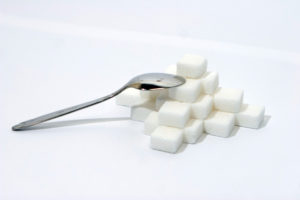
Is there such a thing as sugar addiction?
Many medical researchers say sugar is not addictive. However it’s not straightforward, and sometimes it’s the pattern of avoiding and bingeing which creates addiction-like effects and poor habits. Consequently, the good “hit” we feel when eating or drinking anything laden with sugar will trigger the dopamine rush in the brain. As a result, it hooks us in the same way as it does with any street drug. It’s been found you can get the same hit by swilling the sugar water around the mouth and spitting it out – extra energy with fewer calories.
So what’s wrong with that?
In small quantities sugar is fine and you should be able to avoid those foods high in sugar. If you find yourself unable to refuse – it could be you don’t want to appear ungrateful. When you just can’t walk by a plate of doughnuts without dipping in, then you have a problem. Have you experienced feeling a little nervous, shaky, or even having a cold sweat? Then you could be having a sugar dip caused by your body needing to move glucose out of the bloodstream and into your cells for energy, it does this with insulin.
Sugar fuels every cell in the brain. When you overload on sugary foods, it may alter the parts of the brain that control how much you eat. Consequently, you end up not feeling full and don’t know when to stop eating.
What else can affect it?
Eating refined carbohydrates can release sugar into the blood quickly too. They give you a temporary boost but you end up feeling hungry again quite quickly.
So what can I do to stop the addiction to sugar?
You can do 2 things, you can go on a detox – I suggest you do this under the guidance of a nutritionist. Cut it out of your diet by replacing refined carbohydrates with complex ones. Reduce any foods that contain sugar. Increase eating proteins such as chicken, nuts or pulses.
If you are having problems with this then this is where hypnotherapy can help. By reducing stress, we have greater control and improved willpower. Using hypnotherapy to help get over the things in our life that are stopping us from having that control. Stress at work, within a relationship, or an imbalance in life’s richness are all contributing factors.
Sugar Addiction Case Study
Russell came to see me because he felt down, it was evident that his weight was part of the problem. Subsequently, he experienced terrible mood swings and often lost his temper, then went on a binge. As a result, he’d stash all his chocolate away where no one could see it. Above all, if he had an argument at work, he would go to his car and eat chocolate until he felt sick.
We talked about how he felt whilst eating the chocolate he said he never really tasted the chocolate. Hence it just gave him a rush which made him feel good temporarily. It distracted his mind from the problem at work. But within minutes of doing it, he felt sick, guilty and fed up with himself that he felt he had no control.
Over 10 weeks, we worked on finding other more helpful distractions and he found mindful exercises helped the most. Instead of rushing out to his car to binge, he slowly walked around the car park counting his steps and breathing deeply. Russ also found stretching helped and when I talked to him about posture and how our brains pick up on our feelings he made an effort to stand tall and not slouch so much.
Diet
We looked at the rest of his diet and it was ok, but he was lacking in fruit. As a result, I suggested he took a variety of fruit – Kiwis are high in serotonin which would be a good way to lift his mood. I explained it was better for him to receive sugar this way because it came with vitamins, minerals and fibre. He had a very sluggish digestion and the addition of bananas certainly helped with that. I also encouraged him to eat oily fish as he only ate fried battered cod. Therefore he started experimenting with different dishes where he could incorporate salmon or mackerel.
Furthermore, Russell began to exercise more and slowly cut back each week on the chocolate. By week 10 instead of eating a family-size bar of milk chocolate at one sitting, sometimes two a day, he had cut back to 8 squares. When I mentioned 80% dark chocolate would be even better, he tried that and liked it even more. Slowly through hypnosis and solution-focused questioning, we helped him to only have the dark chocolate perhaps 2 or 3 times a week and only 2 squares. The rest of the time he found alternatives to the snacking finding nuts particularly helpful. Consequently, he had lost a stone and was considering taking up a sport.
